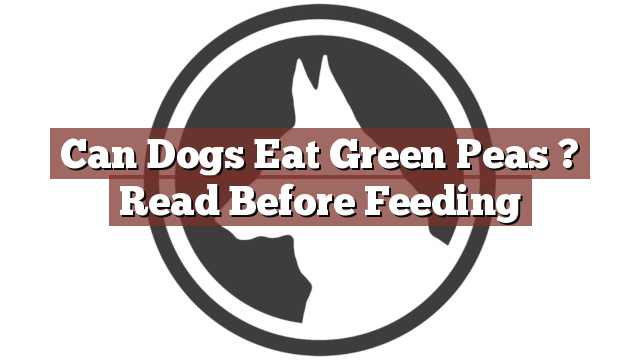Understanding Your Dog’s Dietary Needs
As a responsible pet owner, it is important to understand your dog’s dietary needs. A well-balanced diet plays a crucial role in their overall health and well-being. While it is tempting to share our favorite snacks with our furry friends, it is essential to ensure that the food we offer them is safe and beneficial for their bodies. Can a dog eat green peas? This question often arises, and it is important to be well-informed before making the decision to include green peas in your dog’s diet.
Can Dogs Eat Green Peas? Read Before Feeding
Can dogs eat green peas? The answer is yes, dogs can eat green peas. In fact, green peas are often included in commercial dog food as they offer several health benefits. Green peas are a great source of fiber, vitamins, and minerals. They contain vitamins A, B, and K, as well as essential minerals like iron, potassium, and magnesium. The high fiber content in green peas can help regulate your dog’s digestion and promote a healthy bowel movement. Additionally, dogs can benefit from the antioxidants present in green peas, which can support their immune system.
Pros and Cons of Feeding Green Peas to Dogs
Feeding green peas to your dog has its share of pros and cons. One of the main advantages is their nutritional value. Green peas are low in calories and fat, making them a great option for dogs that need to maintain a healthy weight. They also contain plant-based protein, which can be beneficial for dogs that are allergic to or have difficulty digesting animal-based proteins. However, it is important to note that while green peas are generally safe for dogs, they should be offered in moderation. Too many peas can upset your dog’s stomach and potentially lead to gastrointestinal issues.
Conclusion: Considerations When Feeding Green Peas to Your Dog
Before introducing green peas into your dog’s diet, it is important to consider a few factors. Firstly, consult with your veterinarian to ensure that green peas are suitable for your specific dog’s needs. Every dog is different, and some may have underlying health conditions that can be affected by certain foods. Secondly, introduce green peas gradually into your dog’s diet to avoid any digestive issues. Start with a small portion and observe how your dog reacts. Lastly, always serve green peas in moderation. While they can provide health benefits, an excessive amount can still cause digestive problems. By considering these factors, you can safely incorporate green peas into your dog’s diet and provide them with a nutritious and tasty treat.
Thank you for taking the time to read through our exploration of [page_title]. As every dog lover knows, our furry friends have unique dietary needs and responses, often varying from one canine to another. This is why it's paramount to approach any changes in their diet with caution and knowledge.
Before introducing any new treats or making alterations to your dog's diet based on our insights, it's crucial to consult with a veterinarian about [page_title]. Their expertise ensures that the choices you make are well-suited to your particular pet's health and well-being.
Even seemingly harmless foods can sometimes lead to allergic reactions or digestive issues, which is why monitoring your dog after introducing any new food item is essential.
The content provided here on [page_title] is crafted with care, thorough research, and a genuine love for dogs. Nevertheless, it serves as a general guideline and should not be considered a substitute for professional veterinary advice.
Always prioritize the expert insights of your veterinarian, and remember that the health and happiness of your furry companion come first.
May your journey with your pet continue to be filled with joy, love, and safe culinary adventures. Happy reading, and even happier snacking for your canine friend!

